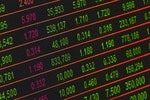
Will GoodRX Stock Bounce Back?
GoodRX (NASDAQ:GDRX) tracks prescription drug prices and its model was…


| Company | Revenue Forecast | Earnings Forecast | Revenue Growth Forecast | Earnings Growth Forecast | Analyst Price Target Median |
|---|---|---|---|---|---|
|
TYOBY
Toyobo
|
-- | -- | -- | -- | -- |
|
NDEKY
Nitto Denko
|
-- | -- | -- | -- | -- |
|
NPSCY
Nippon Steel
|
-- | -- | -- | -- | -- |
|
OJIPY
Oji Holdings
|
-- | -- | -- | -- | -- |
|
SHECY
Shin-Etsu Chemical
|
-- | -- | -- | -- | -- |
|
SOMMY
Sumitomo Chemical
|
-- | -- | -- | -- | -- |
| Company | Price | Analyst Target | Market Cap | P/E Ratio | Dividend per Share | Dividend Yield | Price / LTM Sales |
|---|---|---|---|---|---|---|---|
|
TYOBY
Toyobo
|
$6.85 | -- | $604M | 45.92x | $0.28 | 4.04% | 0.22x |
|
NDEKY
Nitto Denko
|
$19.05 | -- | $13.1B | 27.46x | $0.19 | 1.97% | 5.94x |
|
NPSCY
Nippon Steel
|
$6.36 | -- | $20B | 8.67x | $0.18 | 5.66% | 0.35x |
|
OJIPY
Oji Holdings
|
$51.78 | -- | $4.8B | 16.45x | $0.83 | 3.16% | 0.41x |
|
SHECY
Shin-Etsu Chemical
|
$15.53 | -- | $125.4B | -- | $0.18 | 2.29% | 5.67x |
|
SOMMY
Sumitomo Chemical
|
$11.85 | -- | $3.9B | 15.39x | $0.21 | 2.62% | 0.22x |
| Company | Total Debt / Total Capital | Beta | Debt to Equity | Quick Ratio |
|---|---|---|---|---|
|
TYOBY
Toyobo
|
57.2% | -0.179 | 205.39% | 0.76x |
|
NDEKY
Nitto Denko
|
0.04% | 0.379 | 0.02% | 2.62x |
|
NPSCY
Nippon Steel
|
31.78% | 0.140 | 64.58% | 0.92x |
|
OJIPY
Oji Holdings
|
45.05% | 0.482 | 146.05% | 0.64x |
|
SHECY
Shin-Etsu Chemical
|
-- | 0.799 | -- | -- |
|
SOMMY
Sumitomo Chemical
|
58.81% | -0.303 | 167.73% | 0.82x |
| Company | Gross Profit | Operating Income | Return on Invested Capital | Return on Common Equity | EBIT Margin | Free Cash Flow |
|---|---|---|---|---|---|---|
|
TYOBY
Toyobo
|
$156.1M | $21.3M | 0.4% | 0.85% | 2.38% | -- |
|
NDEKY
Nitto Denko
|
$647.5M | $286.3M | 13% | 13.17% | 17.28% | $57.1M |
|
NPSCY
Nippon Steel
|
$2.3B | $1.1B | 3.97% | 5.91% | 9.01% | $1.8B |
|
OJIPY
Oji Holdings
|
$564.6M | $130.3M | 2.16% | 4.01% | 9.36% | -- |
|
SHECY
Shin-Etsu Chemical
|
-- | -- | -- | -- | -- | -- |
|
SOMMY
Sumitomo Chemical
|
$1.2B | $291.6M | 1.49% | 3.42% | 7.03% | $558.4M |
Nitto Denko has a net margin of 0.58% compared to Toyobo's net margin of 11.19%. Toyobo's return on equity of 0.85% beat Nitto Denko's return on equity of 13.17%.
| Company | Gross Margin | Earnings Per Share | Invested Capital |
|---|---|---|---|
|
TYOBY
Toyobo
|
22.66% | $0.05 | $3.3B |
|
NDEKY
Nitto Denko
|
38.49% | $0.27 | $7B |
Toyobo has a consensus price target of --, signalling downside risk potential of --. On the other hand Nitto Denko has an analysts' consensus of -- which suggests that it could fall by --. Given that Toyobo has higher upside potential than Nitto Denko, analysts believe Toyobo is more attractive than Nitto Denko.
| Company | Buy Ratings | Hold Ratings | Sell Ratings |
|---|---|---|---|
|
TYOBY
Toyobo
|
0 | 0 | 0 |
|
NDEKY
Nitto Denko
|
0 | 0 | 0 |
Toyobo has a beta of -0.102, which suggesting that the stock is 110.165% less volatile than S&P 500. In comparison Nitto Denko has a beta of 0.828, suggesting its less volatile than the S&P 500 by 17.154%.
Toyobo has a quarterly dividend of $0.28 per share corresponding to a yield of 4.04%. Nitto Denko offers a yield of 1.97% to investors and pays a quarterly dividend of $0.19 per share. Toyobo pays 175.99% of its earnings as a dividend. Nitto Denko pays out 27.72% of its earnings as a dividend. Nitto Denko's payout ratio is sufficient to cover dividend payouts with earnings for the foreseeable future, but Toyobo's is not.
Toyobo quarterly revenues are $688.8M, which are smaller than Nitto Denko quarterly revenues of $1.7B. Toyobo's net income of $4M is lower than Nitto Denko's net income of $188.3M. Notably, Toyobo's price-to-earnings ratio is 45.92x while Nitto Denko's PE ratio is 27.46x. Generally a lower price-to-earnings ratio signals a stock is trading at a lower multiple of earnings and is a better value. Another key metric is the price-to-sales ratio, which for Toyobo is 0.22x versus 5.94x for Nitto Denko. Usually stocks with elevated PS ratios are considered overvalued.
| Company | Price/Sales Ratio | Price/Earnings Ratio | Quarterly Revenue | Quarterly Net Income |
|---|---|---|---|---|
|
TYOBY
Toyobo
|
0.22x | 45.92x | $688.8M | $4M |
|
NDEKY
Nitto Denko
|
5.94x | 27.46x | $1.7B | $188.3M |
Nippon Steel has a net margin of 0.58% compared to Toyobo's net margin of 5.47%. Toyobo's return on equity of 0.85% beat Nippon Steel's return on equity of 5.91%.
| Company | Gross Margin | Earnings Per Share | Invested Capital |
|---|---|---|---|
|
TYOBY
Toyobo
|
22.66% | $0.05 | $3.3B |
|
NPSCY
Nippon Steel
|
16.09% | $0.25 | $56.2B |
Toyobo has a consensus price target of --, signalling downside risk potential of --. On the other hand Nippon Steel has an analysts' consensus of -- which suggests that it could fall by --. Given that Toyobo has higher upside potential than Nippon Steel, analysts believe Toyobo is more attractive than Nippon Steel.
| Company | Buy Ratings | Hold Ratings | Sell Ratings |
|---|---|---|---|
|
TYOBY
Toyobo
|
0 | 0 | 0 |
|
NPSCY
Nippon Steel
|
0 | 0 | 0 |
Toyobo has a beta of -0.102, which suggesting that the stock is 110.165% less volatile than S&P 500. In comparison Nippon Steel has a beta of 0.702, suggesting its less volatile than the S&P 500 by 29.751%.
Toyobo has a quarterly dividend of $0.28 per share corresponding to a yield of 4.04%. Nippon Steel offers a yield of 5.66% to investors and pays a quarterly dividend of $0.18 per share. Toyobo pays 175.99% of its earnings as a dividend. Nippon Steel pays out 46.28% of its earnings as a dividend. Nippon Steel's payout ratio is sufficient to cover dividend payouts with earnings for the foreseeable future, but Toyobo's is not.
Toyobo quarterly revenues are $688.8M, which are smaller than Nippon Steel quarterly revenues of $14.2B. Toyobo's net income of $4M is lower than Nippon Steel's net income of $778.4M. Notably, Toyobo's price-to-earnings ratio is 45.92x while Nippon Steel's PE ratio is 8.67x. Generally a lower price-to-earnings ratio signals a stock is trading at a lower multiple of earnings and is a better value. Another key metric is the price-to-sales ratio, which for Toyobo is 0.22x versus 0.35x for Nippon Steel. Usually stocks with elevated PS ratios are considered overvalued.
| Company | Price/Sales Ratio | Price/Earnings Ratio | Quarterly Revenue | Quarterly Net Income |
|---|---|---|---|---|
|
TYOBY
Toyobo
|
0.22x | 45.92x | $688.8M | $4M |
|
NPSCY
Nippon Steel
|
0.35x | 8.67x | $14.2B | $778.4M |
Oji Holdings has a net margin of 0.58% compared to Toyobo's net margin of 5.66%. Toyobo's return on equity of 0.85% beat Oji Holdings's return on equity of 4.01%.
| Company | Gross Margin | Earnings Per Share | Invested Capital |
|---|---|---|---|
|
TYOBY
Toyobo
|
22.66% | $0.05 | $3.3B |
|
OJIPY
Oji Holdings
|
18.69% | $1.74 | $13.6B |
Toyobo has a consensus price target of --, signalling downside risk potential of --. On the other hand Oji Holdings has an analysts' consensus of -- which suggests that it could fall by --. Given that Toyobo has higher upside potential than Oji Holdings, analysts believe Toyobo is more attractive than Oji Holdings.
| Company | Buy Ratings | Hold Ratings | Sell Ratings |
|---|---|---|---|
|
TYOBY
Toyobo
|
0 | 0 | 0 |
|
OJIPY
Oji Holdings
|
0 | 0 | 0 |
Toyobo has a beta of -0.102, which suggesting that the stock is 110.165% less volatile than S&P 500. In comparison Oji Holdings has a beta of -0.011, suggesting its less volatile than the S&P 500 by 101.126%.
Toyobo has a quarterly dividend of $0.28 per share corresponding to a yield of 4.04%. Oji Holdings offers a yield of 3.16% to investors and pays a quarterly dividend of $0.83 per share. Toyobo pays 175.99% of its earnings as a dividend. Oji Holdings pays out 42.73% of its earnings as a dividend. Oji Holdings's payout ratio is sufficient to cover dividend payouts with earnings for the foreseeable future, but Toyobo's is not.
Toyobo quarterly revenues are $688.8M, which are smaller than Oji Holdings quarterly revenues of $3B. Toyobo's net income of $4M is lower than Oji Holdings's net income of $170.9M. Notably, Toyobo's price-to-earnings ratio is 45.92x while Oji Holdings's PE ratio is 16.45x. Generally a lower price-to-earnings ratio signals a stock is trading at a lower multiple of earnings and is a better value. Another key metric is the price-to-sales ratio, which for Toyobo is 0.22x versus 0.41x for Oji Holdings. Usually stocks with elevated PS ratios are considered overvalued.
| Company | Price/Sales Ratio | Price/Earnings Ratio | Quarterly Revenue | Quarterly Net Income |
|---|---|---|---|---|
|
TYOBY
Toyobo
|
0.22x | 45.92x | $688.8M | $4M |
|
OJIPY
Oji Holdings
|
0.41x | 16.45x | $3B | $170.9M |
Shin-Etsu Chemical has a net margin of 0.58% compared to Toyobo's net margin of --. Toyobo's return on equity of 0.85% beat Shin-Etsu Chemical's return on equity of --.
| Company | Gross Margin | Earnings Per Share | Invested Capital |
|---|---|---|---|
|
TYOBY
Toyobo
|
22.66% | $0.05 | $3.3B |
|
SHECY
Shin-Etsu Chemical
|
-- | -- | -- |
Toyobo has a consensus price target of --, signalling downside risk potential of --. On the other hand Shin-Etsu Chemical has an analysts' consensus of -- which suggests that it could fall by --. Given that Toyobo has higher upside potential than Shin-Etsu Chemical, analysts believe Toyobo is more attractive than Shin-Etsu Chemical.
| Company | Buy Ratings | Hold Ratings | Sell Ratings |
|---|---|---|---|
|
TYOBY
Toyobo
|
0 | 0 | 0 |
|
SHECY
Shin-Etsu Chemical
|
0 | 0 | 0 |
Toyobo has a beta of -0.102, which suggesting that the stock is 110.165% less volatile than S&P 500. In comparison Shin-Etsu Chemical has a beta of 1.314, suggesting its more volatile than the S&P 500 by 31.434%.
Toyobo has a quarterly dividend of $0.28 per share corresponding to a yield of 4.04%. Shin-Etsu Chemical offers a yield of 2.29% to investors and pays a quarterly dividend of $0.18 per share. Toyobo pays 175.99% of its earnings as a dividend. Shin-Etsu Chemical pays out -- of its earnings as a dividend.
Toyobo quarterly revenues are $688.8M, which are larger than Shin-Etsu Chemical quarterly revenues of --. Toyobo's net income of $4M is higher than Shin-Etsu Chemical's net income of --. Notably, Toyobo's price-to-earnings ratio is 45.92x while Shin-Etsu Chemical's PE ratio is --. Generally a lower price-to-earnings ratio signals a stock is trading at a lower multiple of earnings and is a better value. Another key metric is the price-to-sales ratio, which for Toyobo is 0.22x versus 5.67x for Shin-Etsu Chemical. Usually stocks with elevated PS ratios are considered overvalued.
| Company | Price/Sales Ratio | Price/Earnings Ratio | Quarterly Revenue | Quarterly Net Income |
|---|---|---|---|---|
|
TYOBY
Toyobo
|
0.22x | 45.92x | $688.8M | $4M |
|
SHECY
Shin-Etsu Chemical
|
5.67x | -- | -- | -- |
Sumitomo Chemical has a net margin of 0.58% compared to Toyobo's net margin of 5.29%. Toyobo's return on equity of 0.85% beat Sumitomo Chemical's return on equity of 3.42%.
| Company | Gross Margin | Earnings Per Share | Invested Capital |
|---|---|---|---|
|
TYOBY
Toyobo
|
22.66% | $0.05 | $3.3B |
|
SOMMY
Sumitomo Chemical
|
28.28% | $0.70 | $15.8B |
Toyobo has a consensus price target of --, signalling downside risk potential of --. On the other hand Sumitomo Chemical has an analysts' consensus of -- which suggests that it could fall by --. Given that Toyobo has higher upside potential than Sumitomo Chemical, analysts believe Toyobo is more attractive than Sumitomo Chemical.
| Company | Buy Ratings | Hold Ratings | Sell Ratings |
|---|---|---|---|
|
TYOBY
Toyobo
|
0 | 0 | 0 |
|
SOMMY
Sumitomo Chemical
|
0 | 0 | 0 |
Toyobo has a beta of -0.102, which suggesting that the stock is 110.165% less volatile than S&P 500. In comparison Sumitomo Chemical has a beta of 0.249, suggesting its less volatile than the S&P 500 by 75.107%.
Toyobo has a quarterly dividend of $0.28 per share corresponding to a yield of 4.04%. Sumitomo Chemical offers a yield of 2.62% to investors and pays a quarterly dividend of $0.21 per share. Toyobo pays 175.99% of its earnings as a dividend. Sumitomo Chemical pays out 25.57% of its earnings as a dividend. Sumitomo Chemical's payout ratio is sufficient to cover dividend payouts with earnings for the foreseeable future, but Toyobo's is not.
Toyobo quarterly revenues are $688.8M, which are smaller than Sumitomo Chemical quarterly revenues of $4.3B. Toyobo's net income of $4M is lower than Sumitomo Chemical's net income of $230.2M. Notably, Toyobo's price-to-earnings ratio is 45.92x while Sumitomo Chemical's PE ratio is 15.39x. Generally a lower price-to-earnings ratio signals a stock is trading at a lower multiple of earnings and is a better value. Another key metric is the price-to-sales ratio, which for Toyobo is 0.22x versus 0.22x for Sumitomo Chemical. Usually stocks with elevated PS ratios are considered overvalued.
| Company | Price/Sales Ratio | Price/Earnings Ratio | Quarterly Revenue | Quarterly Net Income |
|---|---|---|---|---|
|
TYOBY
Toyobo
|
0.22x | 45.92x | $688.8M | $4M |
|
SOMMY
Sumitomo Chemical
|
0.22x | 15.39x | $4.3B | $230.2M |
Signup to receive the latest stock alerts


GoodRX (NASDAQ:GDRX) tracks prescription drug prices and its model was…

Freeport-McMoRan (NYSE:FCX) is among the world’s largest producers of copper…

Levi Strauss (NYSE:LEVI) is among the oldest clothing brands in…
Market Cap: $4.2T
P/E Ratio: 58x
Market Cap: $3.8T
P/E Ratio: 43x
Market Cap: $3.1T
P/E Ratio: 35x
SharpLink Gaming [SBET] is down 2.6% over the past day.
Exodus Movement [EXOD] is down 4.14% over the past day.
Unity Software [U] is up 7.51% over the past day.

